“The sight and sound of babies crying out for food and fluids are why I decided to speak out. Babies are denied food and fluids to promote exclusive breastfeeding.”
As a mother-baby nurse, I’ve seen many preventable episodes of emotional distress for families in my thirty-year career. Unfortunately, The emotional distress increased significantly when the Baby-Friendly Hospital Initiative was implemented at my hospital. Some episodes of emotional distress are unforgettable, so I felt compelled to speak out about them, hoping to bring about the much-needed change to protect newborns from hunger and maternal mental health.
Mothers are incredibly vulnerable after giving birth, as their bodies transition physically and hormonally. They have a new life to take care of while recovering from birth and require compassionate, respectful, and individualized care. However, the Baby-Friendly breastfeeding protocol is one-size-fits-all and does not allow individualized care. Mothers must follow the BFHI protocol regardless of how they feed their baby or how complicated their birth was. We know as health care professionals that no protocol can be safe and effective without individualized care.
Evidence based medicine cannot replace clinical judgment or account sufficiently for the complexity of individual cases. The limitations of EBM must be acknowledged and addressed so that it can be used effectively and without compromising patient care. -Mark R. Tonelli, MD, MA
Parents Are Taught Infant Formula Is Dangerous
I remember caring for a fresh c-section mother who had delivered 37-week healthy twins. Breastfeeding and latching seemed to be going well, but both babies lost almost a pound by the end of day two. These babies were in great danger of complications from insufficient feeding and required supplementation. The mother was so distraught at the thought of feeding her babies infant formula that she sobbed with every feeding. In her mind, she was feeding her babies poison instead of the life-saving nutrition that would keep them healthy until her milk came in to breastfeed them sufficiently. She told me they were taught in their baby-friendly breastfeeding course that infant formula was harmful and would cause multiple diseases such as cancer, obesity, and low IQ, which is false or grossly exaggerated.
The demonization of infant formula that she was taught and read about during pregnancy became part of her beliefs that she couldn’t shake, even after being re-educated. The father of the babies then confided in me that they both swore on a Bible that the babies would not get any formula no matter the reason.
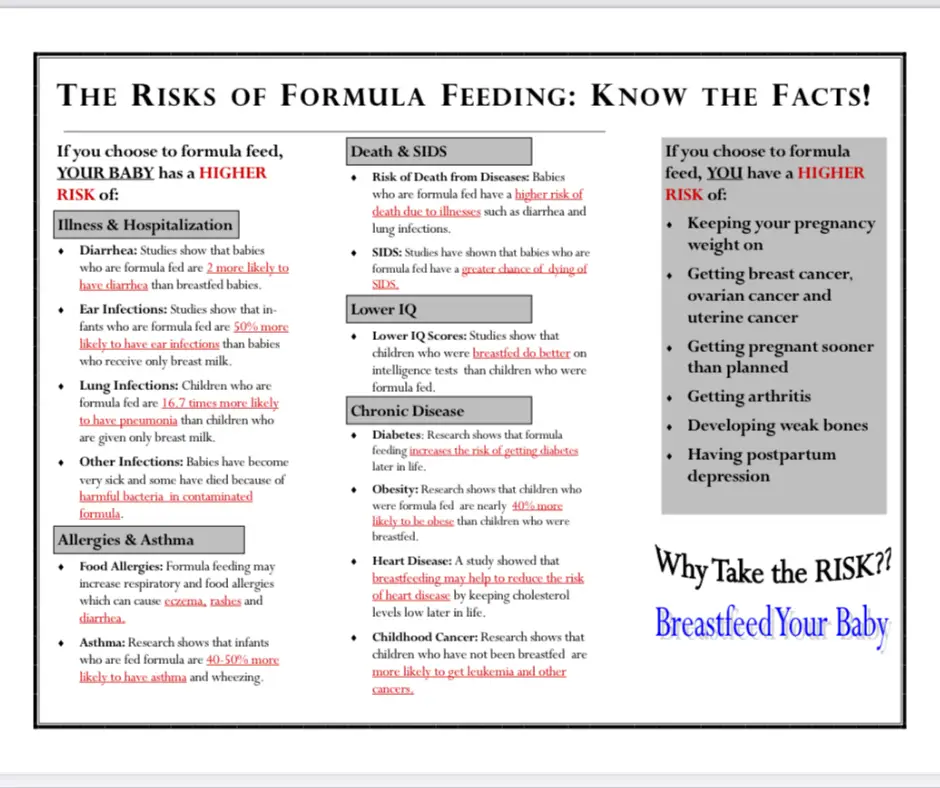
Why are parents lied to about infant formula to promote breastfeeding? Lying to patients is unethical, unprofessional, and morally wrong.
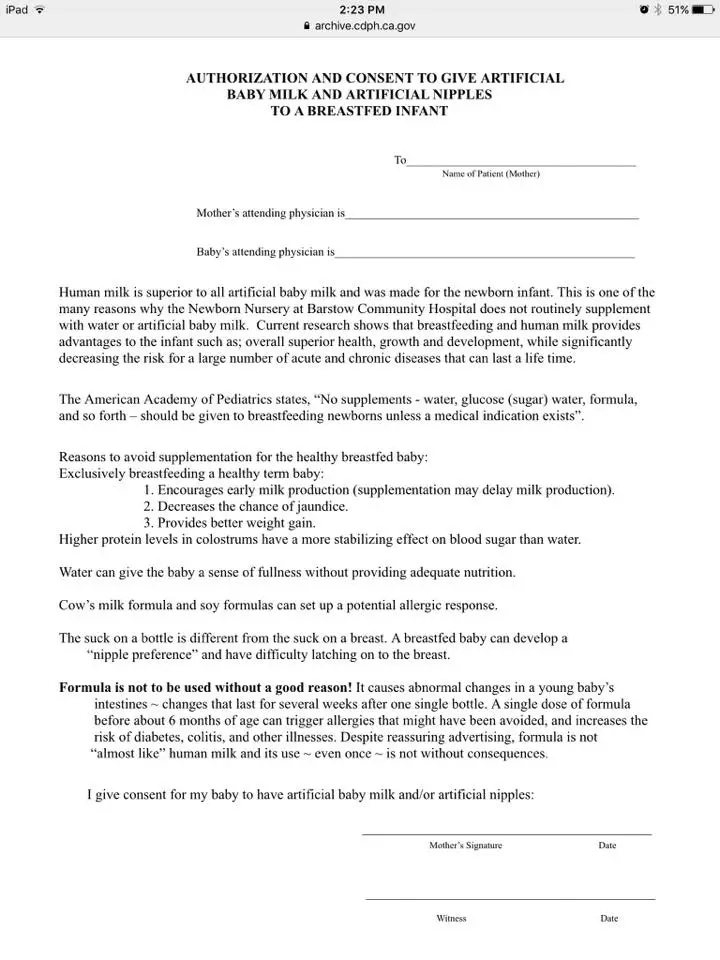
This formula consent form is an example of the lies, and fear-mongering parents must face when using infant formula. Imagine the confusion of a parent whose baby has hypoglycemia; infant formula is necessary to protect their brain from injury or save their life!
Bonding Misinformation
Parents who decided or needed to bottle feed were highly concerned about not bonding with their baby because they were taught breastfeeding promotes a special bond. In both situations, the parents suffered great anxiety, emotional distress, and inadequacy as new parents. In some cases, this strained the relationship with their partners. Research has confirmed that a baby doesn’t bond with breastfeeding or formula feeding—a baby bonds and thrives on being fed with love by present and loving parents.
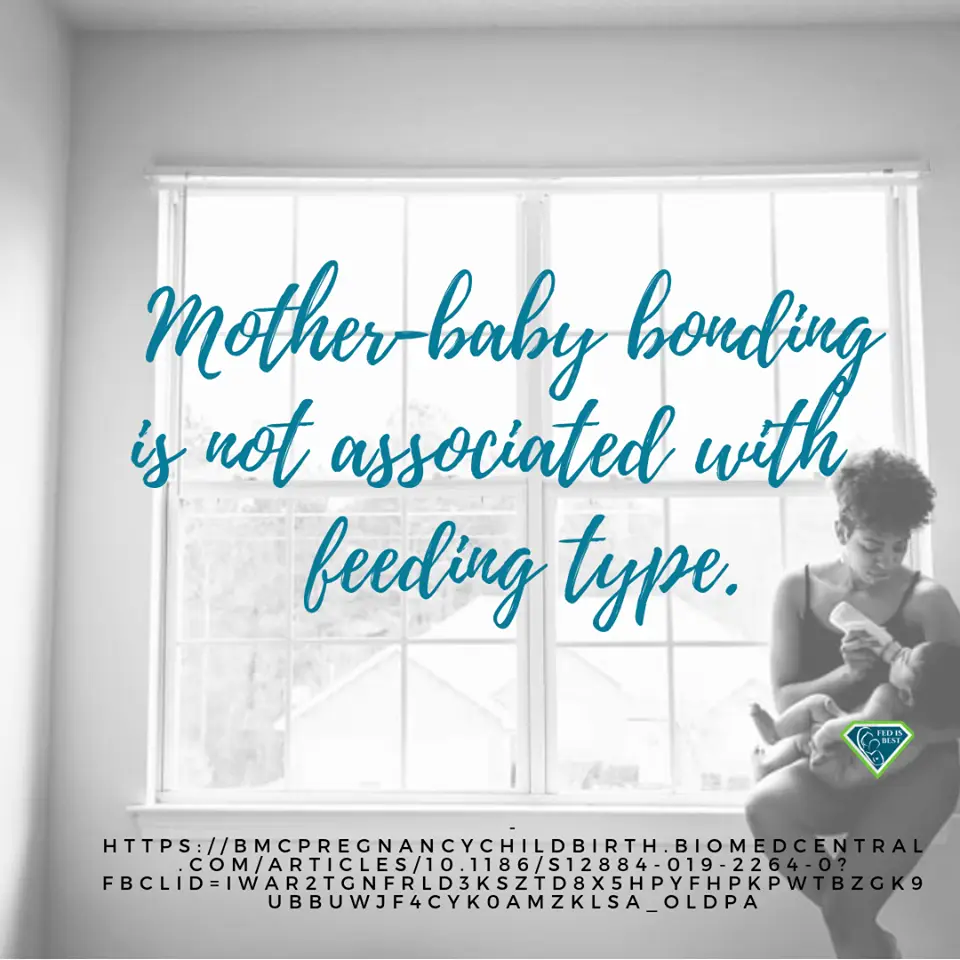
The misinformation about the Second-night syndrome, cluster feeding, and HUNGER
As a nurse and a mother, my instinct has been to respond to someone’s needs and try to alleviate discomfort for as long as I can recall. Parents are taught that constant frantic crying and cluster feeding all night long without satisfaction is normal newborn behavior. I’ve seen many new mothers go against their intuition and accept this even though it causes them much distress. “A baby crying out from hunger is so painful to hear.”
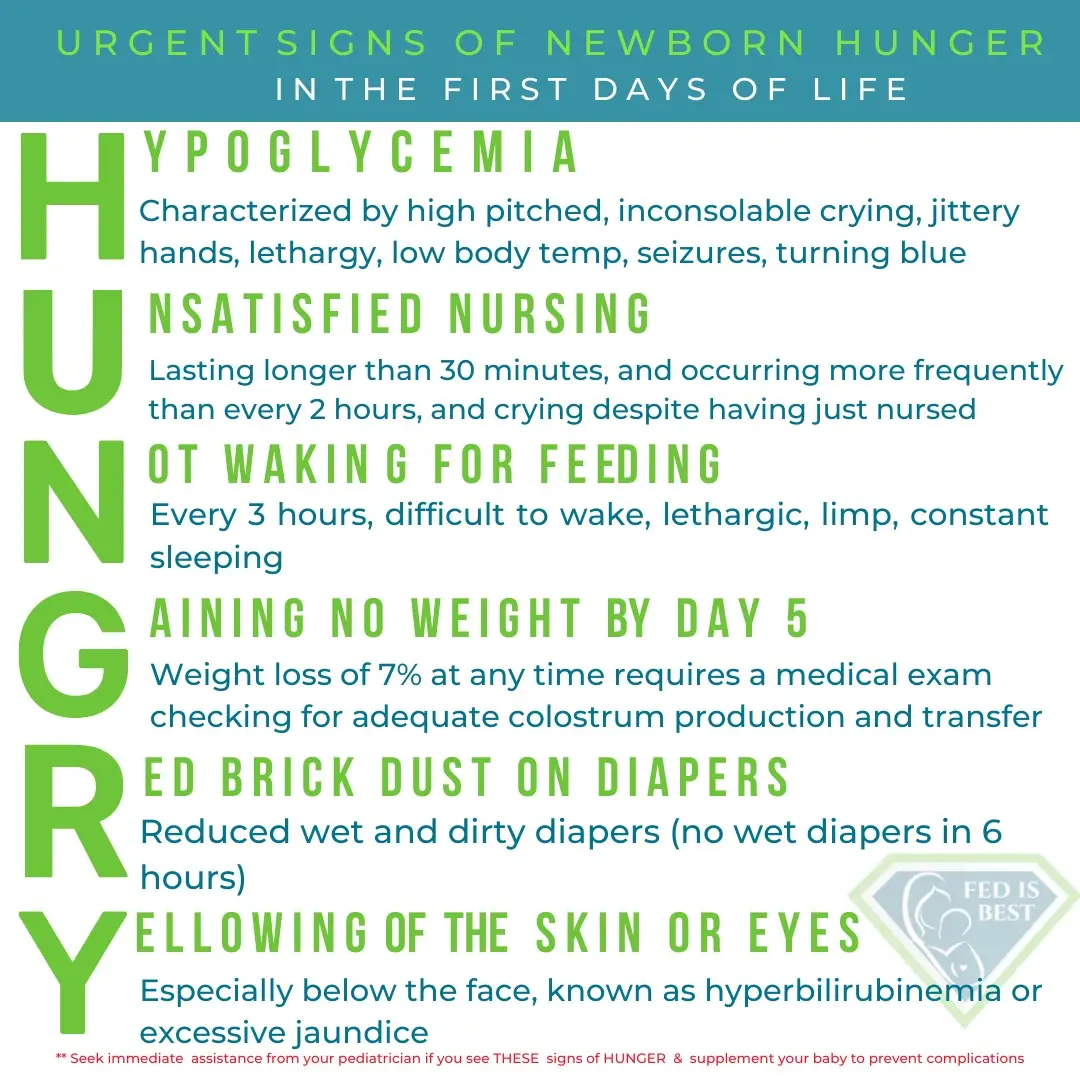
The signs of newborn hunger
I frequently and proudly advocated for babies under my care when I knew they were hungry. I discussed temporary supplementation with their parents to ensure these babies were comfortable and safe. But many nurses and physicians seem intimidated by lactation consultants and the policies they know can be detrimental to patient safety. A baby crying for hours even after being fed at the breast does not have their physiological needs met.
Basic human needs like hunger, thirst, and sadly, even the essential requirement to be comforted when in distress are ignored, and newborn hunger has been normalized.
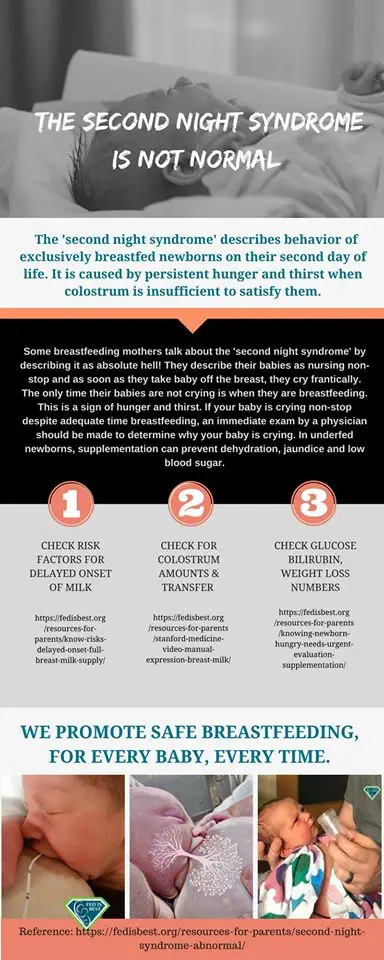
Sleep Deprivation and Profound Exhaustion
An example of how the BFHI has caused many new parents emotional distress is a complete lack of understanding and compassion regarding extreme sleep deprivation. It’s not unusual to see new parents become joyless and angry, often with each other. Tears are a common occurrence. Family members who start out wanting to stay and help become exhausted themselves. Being a night shift nurse, I’ve seen many fathers leave during the night because the constant crying of a second-night breastfed baby who is awake all night becomes intolerable, and the mom is left exhausted and all on her own.
This is also the time when most newborn falls happen. Actually, in my unit, most of the falls were from our Dads falling asleep in a chair holding the fussy baby, trying to let mom rest. Again, completely preventable- just an ounce of formula will satisfy the baby’s hunger, and mom and dad can rest while the baby is asleep. This allows them to experience the pure joy of being a new parent.
Breastfeeding Education is Not Based on Current Research
Baby-Friendly education for health care professionals has caused some new nurses to accept that a baby’s stomach can only hold 5-7 cc’s, that breastfeeding alone will bring up a baby’s low blood sugar, and that supplementation is unnecessary for a crying dehydrated baby under phototherapy lights. None of this is accurate, causing delayed treatment and sometimes adverse outcomes, which is unacceptable.
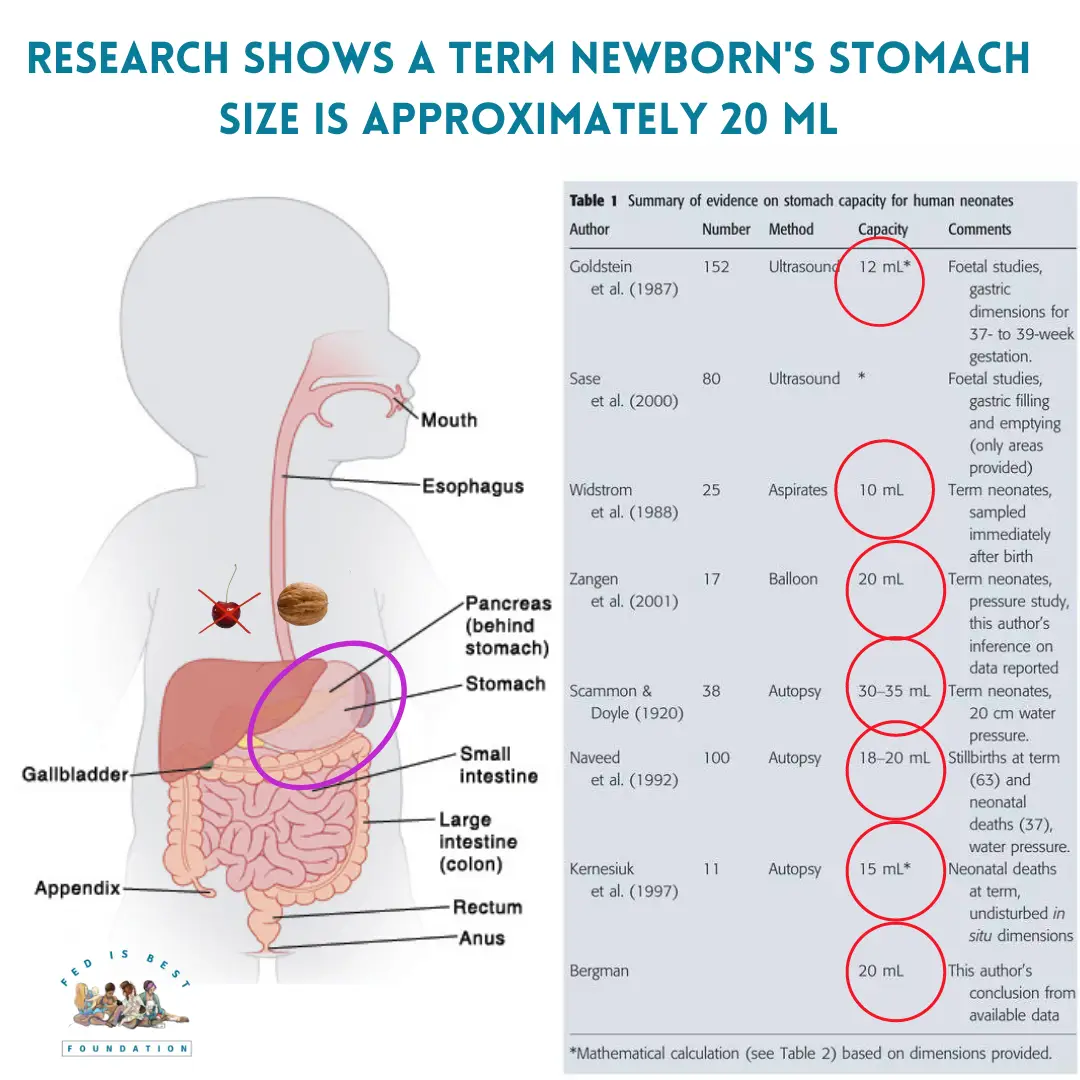
The Emotional Toll On The Nurses
Those of us who have had a long career in maternal newborn nursing have seen this insidious change take over logical critical thinking practices that nurses depend on to care for their patients safely and for optimal outcomes. Nurses also endure emotional stress when they know a baby is hungry and must wait until the baby develops medical complications to supplement them. Unless medically necessary, the rule is no formula, and prevention is not part of the Baby-Friendly protocol.
Nurses also experience emotional stress from the fear of consequences when making choices to protect their patients that go against the Baby-Friendly protocol. One such example is taking a baby to the ‘false’ nursery so a single mom with no support can get some rest and sleep and not have to worry about taking care of her baby and herself. I’ve experienced sadness witnessing other nurses accept this policy, and I mourn the loss of the nursing practices based on evidence-based guidelines and individualized care.
The Emotional toll on The Physicians
I’ve seen physicians who seemed reluctant to talk to lactation about their concerns, which was troubling to me. I will never forget the pediatrician who argued with the lactation consultant about supplementing and finally said, “the bottom line is- I’m the physician.” From then on, his babies were supplemented without consequences for the nurses.
The Baby-Friendly protocol has glaring omissions of supporting and protecting maternal mental health, namely psychological or social considerations that mothers face. We must develop and practice patience-centered evidence-based care for the best parenting outcomes.
I would say to the BFHI supporters that exclusive breastfeeding can be good and works well for some. Still, I would like them to admit that it does not work for every mother because not every mother produces enough colostrum for her baby, and not every mother can take care of their baby or themself after delivery.
~Irene Ford
#fedisbest
Are you a health care professional and want to join our advocacy?
Please click here click here to join our private Facebook group.
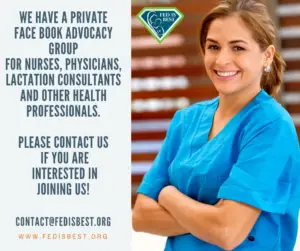
Additional blog links from nurses and doctors
Nurses Are Speaking Out About The Dangers Of The Baby-Friendly Health Initiative – Fed Is Best
Q&A: One Nurse’s View on Strict Breastfeeding Policies
Hospital Drops Baby-Friendly Program After Doctor’s Baby Was Harmed – Fed Is Best
Two Physicians Describe How Their Baby-Friendly Hospital Put Their Newborn in Danger – Fed Is Best
Writing Your Hospital and the Joint Commission About Your Baby’s Feeding Complications – Fed Is Best
If I Had Given Him Just One Bottle, He Would Still Be Alive. – Fed Is Best
From a Pediatric Nurse Practitioner, “You Are Not Alone.” – Fed Is Best
THANK YOU FOR YOUR INTEREST IN THE FED IS BEST FOUNDATION!
Our mission statement is:
The Fed Is Best Foundation works to identify critical gaps in the current breastfeeding protocols, guidelines, and education programs and provides families and health professionals with the most up-to-date scientific research, education, and resources to practice safe infant feeding, with breast milk, formula or a combination of both.
Above all, we strive to eliminate infant feeding shaming and eliminate preventable hospitalizations for insufficient feeding complications while prioritizing perinatal mental health.
HOW YOU CAN SUPPORT FED IS BEST
There are many ways you can support the mission of the Fed is Best Foundation. Please consider contributing in the following ways:
- Join us in any of the Fed is Best volunteer and advocacy groups. Click here to join our health care professionals group. We have FIBF Advocacy Group, Research Group, Volunteer Group, Editing Group, Social Media Group, Legal Group, Marketing Group, Perinatal Mental Health Advocacy Group, Private Infant Feeding Support Group, Global Advocacy Group, and Fundraising Group. Please email Jody@fedisbest.org if you are interested in joining any of our volunteer groups.
- If you need infant feeding support, we have a private support group– Join us here.
- If you or your baby were harmed from complications of insufficient breastfeeding, please send a message to contact@fedisbest.org
- Make a donation to the Fed is Best Foundation. We are using funds from donations to cover the cost of our website, our social media ads, and our printing and mailing costs to reach health providers and hospitals. We do not accept donations from breast- or formula-feeding companies and 100% of your donations go toward these operational costs. All the work of the Foundation is achieved via the pro bono and volunteer work of its supporters.
- Sign our petition! Help us reach our policymakers, and drive change at a global level. Help us stand up for the lives of millions of infants who deserve a fighting chance. Sign the Fed is Best Petition at Change.org today and share it with others.
- Share the stories, and the message of the Fed is Best Foundation through word-of-mouth, by posting on your social media page, and by sending our FREE infant feeding educational resources to expectant moms you know. Share the Fed is Best campaign letter with everyone you know.
- Write a letter to your health providers and hospitals about the Fed is Best Foundation. Write to them about feeding complications your child may have experienced.
- Print out our letter to obstetric providers and mail them to your local obstetricians, midwives, and family practitioners who provide obstetric care, and hospitals.
- Write your local elected officials about what is happening to newborn babies in hospitals and ask for the legal protection of newborn babies from underfeeding and of mother’s rights to honest informed consent on the risks of insufficient feeding of breastfed babies.
- Send us your stories. Share with us your successes, your struggles, and everything in between. Every story saves another child from experiencing the same and teaches another mom how to safely feed her baby. Every voice contributes to change.
- Send us messages of support. We work every single day to make infant feeding safe and supportive of every mother and child. Your messages of support keep us all going.
- Shop at Amazon Smile and Amazon donates to Fed Is Best Foundation.
Or simply send us a message to find out how you can help make a difference with new ideas!
For any urgent messages or questions about infant feeding, please do not leave a message on this page as it will not get to us immediately. Instead, please email christie@fedisbest.org.
Thank you, and we look forward to hearing from you!
